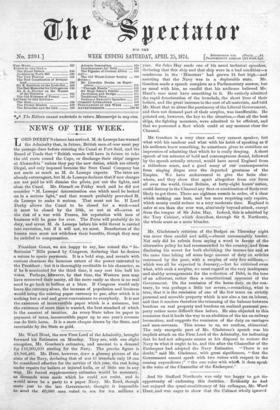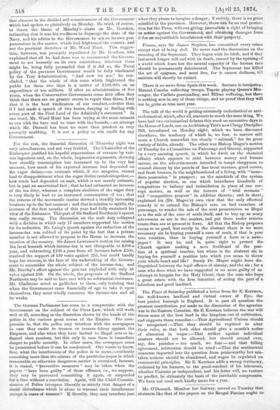And Sir Stafford Northcote was only too happy to get
the opportunity of endorsing this doctrine. Evidently he had not enjoyed the quasi-recalcitrancy of his colleague, Mr. Ward Hunt, and was eager to show that the Cabinet wholly ignored that element in the divided sell-consciousness of the Government which had spoken so plaintively on Monday. He tried, of course, to throw the blame of Monday's alum on Mr. Goscheu, intimating that it was his readiness to disparage the state of the Navy, and his advice to the Government to act on its own pre- possessions in the matter, which had frightened the country, and not the pessimist doctrines of Mr. Ward Hunt. This sugges- tion, however, was promptly repudiated by Mr. Goschen, who explained that all he had done was to recommend the Govern- ment to act honestly on its own convictions, whatever these might be, being fully persuaded that if it did so, the Naval policy of the previous Government would be fully vindicated by the Tory Administration. "And now we see," he con- cluded, " that the whole of this scare which frightened the public for these two days is a matter of £100,000, on an expenditure of ten millions. If after an administration of five years, when the Conservative Government come into office they think that there are no greater errors to repair than these, I say that it is the best vindication of our conduct,—better than if I had made a speech of two hours, denying or dealing with every part of the First Lord of the Admiralty's statement." In one word, Mr. Ward Hunt has been trying at the same moment to run with the hare and to hunt with the bounds,—an attempt which Mr. Disraeli has been no more than prudent in very promptly snubbing. It is not a policy to win credit for any Government.



































